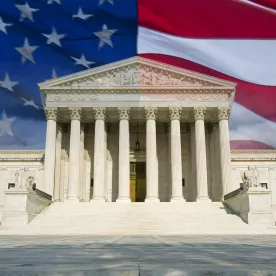On Friday, June 28, 2019, the Supreme Court granted certiorari in Romag Fasteners, Inc. v. Fossil, Inc. to decide whether a showing of willfulness is necessary to obtain a defendant’s profits under the Lanham Act.
In Romag, the plaintiff, a manufacturer of magnetic snap fasteners, sued Fossil and various retailers for, among other things, infringement of an unregistered trademark in violation of section 1125(a) of the Lanham Act based on their sale of merchandise that featured snaps bearing the Romag mark. A jury found Fossil liable for infringing Romag’s trademark and determined that Fossil should disgorge close to $90,000 in profits to prevent its unjust enrichment. However, the district court held that Romag was not entitled to disgorge Fossil’s profits because it failed to prove Fossil’s trademark infringement was willful. The Federal Circuit affirmed the district court’s decision not to permit disgorgement.
As both the district court and the Federal Circuit acknowledged, there is a stark circuit split as to whether proof of willfulness is required to recover a defendant’s profits for a violation of section 1125(a). The split centers over how to interpret section 1117(a) of the Lanham Act, which reads as follows:
When a violation … under section 1125(a) or (d) of this title, or a willful violation under section 1125(c) of this title, shall have been established in any civil action arising under this chapter, the plaintiff shall be entitled … subject to the principles of equity to recover defendant’s profits. (Emphasis added)
The circuit conflict revolves around whether the above italicized language reflects Congress’s intent that a showing of willfulness is required only for disgorgement awards in trademark dilution cases brought under section 1125(c), or instead that willfulness is also required in cases brought under section 1125(a) for infringement of an unregistered trademark, false designation of origin, or false advertising. The Third, Fourth, Fifth, Sixth, Seventh, and Eleventh Circuits do not require plaintiffs to show willfulness for disgorgement in section 1125(a) cases, while the remaining circuits do.
Of particular relevance to this blog, the Supreme Court’s ultimate decision in Romag should apply to false advertising cases as well as trademarks, as Lanham Act section 1125(a) covers both. The availability of a disgorgement remedy is particularly vital in many false advertising cases, because it is often difficult for the plaintiff to prove that its own profits were diminished by the defendant’s false advertising, as opposed to other factors in what often is a noisy marketplace. Thus, a requirement that Lanham Act false advertising plaintiffs must prove willfulness to obtain disgorgement may be the difference between a significant damages award and no recovery at all. Accordingly, this is an important case for false advertising litigants, and one we will be monitoring closely.
Watch this space for further developments in Romag. We will report back once the Supreme Court issues its decision.






 />i
/>i
